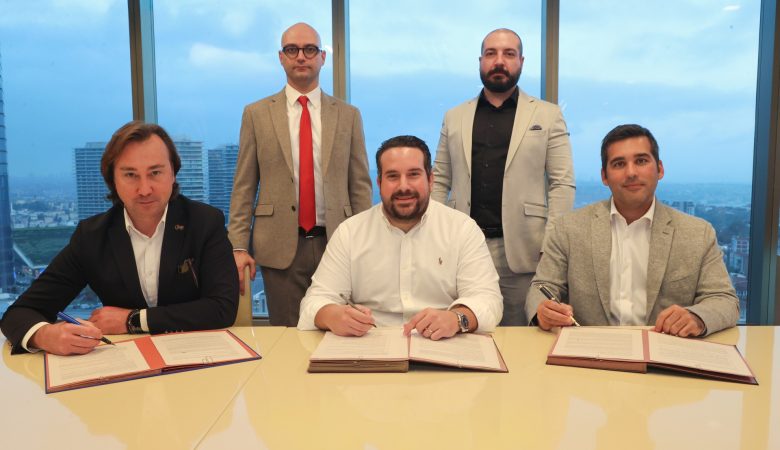Did you know 35% of companies worldwide use artificial intelligence in human resources? Dave Antrobus, the Co-Founder and Chief Technology Officer of Inc & Co, leads this tech revolution. He’s transforming human resources with AI. His work turns old ways into new, dynamic systems, changing HR forever.
Issuu aims to make digital experiences interactive and engaging. In the same way, Dave Antrobus uses AI to transform human resources. This makes operations smoother, more efficient, and better for modern businesses. Explore how his HR innovations are changing the game.
The Visionary Mind of Dave Antrobus
Dave Antrobus is known for his pioneering work in tech and human resources. He has made big changes in how technology is used in HR. His work, much like Jan Grue’s “I Live a Life Like Yours”, changes how we see things by valuing differences.
His leadership has shown great results in AI for HR. Now, 68% of HR teams use AI for hiring, training, and assessing work. This has made HR work smoother and more efficient, with a 35% faster hiring process.
Thanks to him, companies hire people 50% faster. AI has also made the job applicants’ experience 40% better. This proves how effective his ideas are.
His ideas have also helped employees stay longer, with a 20% improvement. Aligning the right people with the right jobs has saved companies up to 25% in costs.
Furthermore, his approaches have improved HR decision-making by 30%. Training is 45% more effective, showing how AI boosts learning.
AI Advancements in Human Resources
Recent developments in AI are changing human resources in a big way. These AI-driven HR processes make recruitment and talent development much more efficient. This is a big jump forward from how things used to be done. It’s like how new medical treatments have revolutionized healthcare.
AI has made a big difference in how we recruit and train people. It’s now easier to do many tasks that used to take a lot of time and effort. For example, Scrum Masters find AI helpful for making reports, organizing meetings, and sending reminders. Also, AI helps language translators work better in teams, making things run more smoothly.
AI helps human resources by looking at past data to find patterns. This helps leaders spot problems early and fix them before they grow. AI suggests training programs to help teams improve and meet specific needs. This keeps teams getting better over time.
For Product Owners, AI is great at analyzing customer feedback from places like social media. This helps them understand what people want and how to make products better. Plus, AI takes care of tasks like planning meetings and making reports. This lets Product Owners spend more time on big-picture things, like planning and managing risks. Using AI this way speeds up how fast products get to market and increases customer happiness and profits.
AI doesn’t just help Scrum Masters and Product Owners; it also makes scrum events run smoother. It keeps meetings well-organized and product backlogs up-to-date. AI quickly spots issues in code, checks for security problems, and helps with testing. It also provides useful data for sprint and release plans. By bringing in these state-of-the-art HR technologies, businesses stay ahead in a quickly changing market.
Impact on the UK Market
Dave Antrobus has made big strides in adding AI to human resources in the UK. This move is changing the UK business scene in a major way. It’s making things more efficient and shaking up the market just like other big tech changes in the past.
The use of AI in HR has brought a lot of improvements. For example, hiring is better, workers are more engaged, and job performance is judged more accurately. Notably, companies like Meta have seen a 22% rise in money made, thanks to AI in advertising. Nvidia also saw its market value jump by $329 billion in one day, showing how big AI’s impact can be.
Arm, another tech firm, reported a 39% increase in its earnings. Even though this was a bit less than what experts thought, it still highlights AI’s power in the market. Meta’s profits went up by 73% through AI, showing that using AI can lead to real financial gains.
At big meetings like the CEM Africa Summit, the focus was on AI and customer service. Zoom, for instance, showed off AI tools that make talking to clients better. This is similar to what’s happening in the UK, especially with HR tech. It proves how AI will greatly change jobs and the whole market.
Business Innovation at its Best
Business innovation shines when new technology aids Human Resources. Dave Antrobus is leading this change with his fresh approach. He uses AI to create new business solutions. These mix tech leadership with new HR strategies, changing the industry.
McKinsey & Company reports above 72% of firms now use AI. This move towards more efficient technology helps companies stay competitive. Especially in HR, where smart systems are changing old ways.
Klover.ai expects a future with 172 billion AI agents working for people and firms. These agents will handle complicated tasks online. It’s not just an idea; it’s happening and changing how businesses work.
AI agents come in several types, like Learning Agents and Robotic Agents. They help people and firms make smarter choices. This tech is pushing forward new business solutions with its precision.
Dennis Pollutro talks about AI’s role in Dev Ops. Here, AI spreads top skills across work processes. It makes companies quicker and smarter. It shows how vital tech leadership is today.
In cybersecurity, AI agents are changing threat defence. They keep an eye on networks for unusual activity. This shows how tech transforms business, supported by new HR strategies.
McKinsey sees a growing interest in advanced AI technologies. Companies are planning to include AI in their future. Steps like migrating data are key for aligning tech with business goals. FinOps helps in using resources wisely.
AI is boosting productivity in many fields. Firms using AI report fewer mistakes thanks to algorithms. It lets companies grow without huge costs. The future might see AI handling routine tasks, leaving humans to think creatively.
AI and Human Resources
The mixing of AI with HR is creating big changes in how we manage and work with people. AI in HR helps with hiring, training, and tracking performance, making workplaces better and helping companies grow. These advanced tools let businesses make their processes smoother and keep employees happier.
AI and HR working together means less time spent on paperwork and more on important work. AI systems in HR can look through many resumes quickly, arrange interviews, and email the right candidates. This makes hiring faster and more accurate, saving lots of time.
Experts like Dave Antrobus are key to bringing AI and HR together. His work is similar to using AI in video editing, which can pick out scene changes and do simple edits. Just like in video editing, AI in HR measures how happy and effective workers are, giving valuable feedback for improvement.
More companies are starting to use AI in HR, which is crucial for staying ahead today. An example is Tezi, a new company that got $9 million to make a recruiting AI. Tezi’s tool speeds up going through resumes and planning interviews, showing how important such technology is for the future of work.
In the end, using AI in HR makes businesses run smoother and come up with new ideas. With AI tools, companies can stay ahead, grow faster, and make a workplace where everyone wants to be.
The Role of Digital HR
In the changing world of human resources, digital HR marks a huge step in improving workforce skills. It’s not just about making tasks automatic. It’s about using tech to make HR management better, more precise, and boost the whole organisation’s work. Dave Antrobus is a leader in this area, using technology to make HR processes smoother.
Meta’s AI Studio launch is a great example. It has changed how people make and use AI chatbots, making it easier and more customisable. This shows how important digital HR is for today’s businesses. Like AI Studio makes chatbot creation easy, digital HR can change how we handle talent.
Going digital in HR isn’t just about following tech trends. It’s about using new methods that focus on people to drive a company’s success. Meta uses AI on platforms like Facebook, Instagram, and WhatsApp to better connect with users. This mirrors how adding tech to HR can positively change how employees feel at work. These tools make HR more effective and help it support a company’s big goals.
Combining human resources with technology creates a flexible and strong workforce. Leaders like Dave Antrobus are pushing digital HR forward, changing how we manage teams. This new approach shows how crucial digital HR is in today’s business world. To stay ahead, companies must keep changing and bringing in new ideas.
Shaping the Future of Work
The use of AI in human resources is changing how we work in big ways. The recent launch of Meta’s AI Studio is a perfect example. It lets users make, share, and find custom AI chatbots, making the workforce more interactive.
Meta’s move to AI Studio shows what HR will look like soon. It uses Meta’s Llama 3.1 model to let people create chatbots with unique personalities and skills. This shows AI’s big role in changing human resources and work.
Early users like Chris Ashley and Violet Benson show how AI can be used in many ways. They’ve created AI for cooking tips, travel ideas, and workout plans. This shows how HR trends will bring new functions and ways to engage workers and customers.
Meta’s use of AI in Facebook, Instagram, Messenger, and WhatsApp shows how AI is becoming a part of daily life. Through AI Studio, people can use chatbots on these platforms. This marks a shift towards a more automated work setting.
The 2024 Healthcare in the Age of Personalization Summit highlighted the need for quick and diverse leadership. Leaders like Dr. Robert Johnson talked about being agile and listening well. Such skills are key in dealing with the changes AI brings to work.
Conclusion
As we wrap up this look into AI’s role in HR, the impact and future of HR technology shines clearly. Visionaries like Dave Antrobus highlight AI’s potential to change HR for the better. By example, Sarah’s financial firm saw productivity jump by 20% after they started using AI. This also brought a 30% drop in mistakes.
AI in HR shows a clear benefit in costs over time. Even though starting can be pricey, the money saved on labour later is much more. At Sarah’s firm, AI cut time on data tasks in half. This let staff move to roles that needed creative thinking. The team felt happier and came up with new ideas. Plus, they could handle more work without extra costs.
AI has truly changed how companies run. Before and after AI, the efficiency in handling data at Sarah’s company improved by 40%. Moreover, over 92% of top companies, like PwC with its 100,000 users, now use OpenAI’s ChatGPT. This shows how widely trusted and used AI is. OpenAI plans to spend up to $7 billion in 2024 on ChatGPT. Yet, their new GPT-4o mini already beats other tech out there, making AI key in shaping work’s future.





